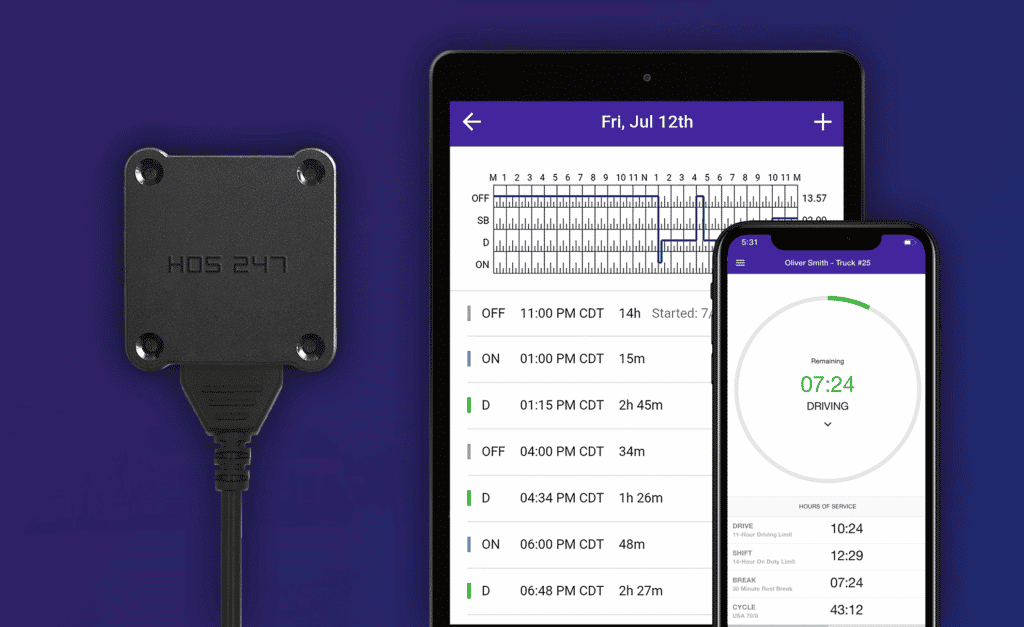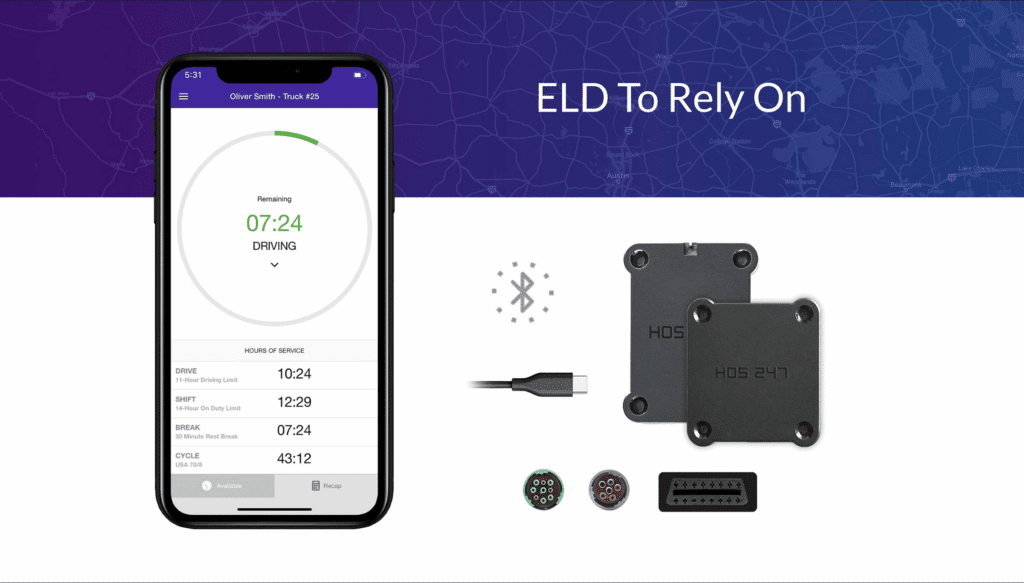The rules on how commercial drivers should record their hours of service are changing, and all truckers and trucking companies operating within Canada need to take note of the Canadian truck driver electronic log law coming into effect on June 21, 2021.
In June 2019, Transport Canada announced legislation changing the way commercial truck drivers are required to keep daily logs of their work. Previously commercial drivers were required to use paper logs, but following the ELD Mandate, the new regulation necessitates the use of electronic logging devices (ELDs) to track and record hours of service.
The Government introduced this mandate in order to:
- Help reduce driver fatigue by enforcing compliance with the hours of service regulations
- Reduce admin costs for all industry stakeholders
- Maintain industry competition by preventing HOS violations.
- Improve drivers’ quality of life
Both the Canadian Trucking Alliance and Teamsters Canada have praised the government for their decisive move, showing appreciation for the added safety and competition fairness benefits of transitioning to e-logs.
What is the Electronic Truck Logs Law?
In its simplest form, the Electronic Truck Logs Law (or the ELD Mandate) is a directive that states Electronic Logs for Truck Drivers Law must be used in commercial trucks and buses. These ELDs are an electronic logbook that records and monitors key Hours of Service (HOS) information such as driving time, location, engine hours, movement, and distance traveled.
The new rules regarding the use of ELD in commercial vehicles are a result of years of both industry and public comments on how to make the industry safer and fairer. It’s useful to know the timeline of how these rules came to be, and also crucial to note the compliance deadline in readiness.
December 16, 2017:
The Canadian Government published their proposed regulation amendments in the Canada Gazette and commences its public comment period. The Government spelled out this requirement for commercial drivers to fit electronic loggers to match the corresponding US rules implemented two days after on December 18.
June 13, 2019:
Transport Canada announces the final rule on the use of ELDs and reveals the compliance deadline.
June 21, 2021:
The deadline for compliance with the ELD mandate. All carriers must transition to electronic logbooks before this date.
Federally regulated carriers will need to equip trucks with certified ELDs beginning June 12, 2021.

What are the benefits of using Electronic Logs For Truck Drivers Law?
Away from ensuring that trucking fleets are fully compliant to the law, Electronic Logbooks provide several additional benefits, including:
Less administration
By automatically tracking the Hours of Service information, ELDs remove for truckers the often time-consuming task of completing paperwork. The automation also ensures that there are no errors entered, creating a more efficient and streamlined process.
ELDs can also automate the quarterly IFTA report. This will save fleet owners thousands of dollars in administrative time as well as guaranteeing there are no errors.
Identify faults
ELDs connect directly the vehicle’s diagnostics, which means they can constantly track the health of the truck. This is particularly useful for fleet owners, who are then able to quickly and easily monitor their entire fleet in real-time.
Improve driving habits
ELDs also help drivers to review their habits, helping to identify typical faults such as heavy braking or excessive acceleration. By identifying this, drivers and fleet owners can work to improve the areas; increasing the safety of a trucker and reducing the risk of an accident. Research from the FMCSA suggests that implementing electronic truck logs law can save on average 26 lives each year and over 562 injuries.
Alongside that, identifying and correcting these problem areas can also help to save thousands of dollars by reducing fuel wastage from engine idling.
Increased profit
When all of these are combined, it can lead to significant profit increases for drivers and fleet managers. Whether it is via decreased fuel consumption, improved route management, better insurance rates, or better driver retention rates; ELDs can transform the future of a business.
Hours of Service Exemptions
Any trucker or fleet operating in Canada is subject to these new rules requiring the use of electronic loggers. In some cases, however, the regulations allow some specific exemptions:
- If the commercial driver is operating under a permit from a provincial or territorial HOS director;
- The vehicle or its engine was manufactured before 2000;
- Drivers that are only required to make HOS logs no more than eight days in a 30-day period.
- Hold a statutory exemption, including a timecard exemption
Or if the driver is not required to keep any daily logs due to the following exemptions:
- The driver drives a commercial vehicle within a 160km radius of their home terminal;
- The driver returns to their home terminal each day for a minimum of eight consecutive hours off-duty.
Please note that using a mobile home or travelling and/or living in the US are not exemptions to the ELD rule.
Maintaining compliance
Ensuring full compliance with the electronic log for truck driver’s law should be the number one priority for fleet owners and truckers alike. As regulations adapt and change, implementing an electronic logbook will help to maintain compliance, improve efficiency, and boost profits.
The HOS247 electronic logging devices are amongst the very best in the industry today. Capable of being installed in just a matter of minutes, the HOS247 ELDs connect directly to smartphones and tablets and provide unrivaled monitoring and tracking to the trucking industry.
The industry-leading system can provide real-time updates on the truck’s diagnostics, habits of the driver, and their current Hours of Service compliance. In turn, this allows back-office staff to make live decisions, helping to improve the efficiency and performance of the company.
The easy to use truck drive log book app helps drivers to prevent any violations, ensuring HOS compliance with the simple managing and editing features. The app also automates IFTA state mileage calculations to reduce any human error from occurring.
What sets the HOS247 system apart, however, is the in-depth customer service it provides to customers. Every single company has a personal account manager assigned to them, acting as a direct link and ensuring there is always support when needed.

Alongside helping to support managers with their electronic logbooks, the customer support team is also on hand to answer any questions, any time. The multilingual team speaks English, Spanish, Russian, and Polish, helping to provide drivers and businesses with the personalized support they deserve.
Thousands of drivers and fleet owners across the country are utilizing the HOS247 Electronic Logging Devices and services. The brand is so confident in its range of products and services that it does not lock customers into a contract. All fees are shown upfront and anyone who is not satisfied within the first two weeks of the service can enjoy a hassle-free return.
Keeping on top of administrative duties, managing a fleet of trucks, and trying to successfully expand a business is a challenge. Installing an electronic logbook into the vehicle not only helps to significantly reduce the admin but also prevents user errors and improves efficiency. Find out more about the HOS247 system and check out the pricing today.

I’ve co-founded, built and managed several transportation-related businesses. Now, I’m a founder and CEO of HOS247 – an AI Transportation Platform for trucking companies, freight brokers and other logistics operations. We are transitioning old-style operations to technology-advanced logistics entities and help them to grow their businesses. ELDs (electronic logging devices), fleet tracking and management 2.0 combined with AI-powered dispatch tools.












As a trucker, you know that electronic logging devices (ELDs) are more than just another gadget in your cab – they’re your digital co-pilot for staying compliant and running smooth operations. Whether you’re shopping for your first electronic logbook or

Drivers are subject to inspection by the FMCSA at any time. It is best to stay on the safe side, and that includes having a dependable truck driver log. To do that, drivers looking for an ELD should spend some

Canadian Vehicle Log Book App for Android and iOS Drivers in Canada will soon have a legal obligation to use an ELD for their commercial operations. These ELD systems have many advantages: they support fleet maintenance, reduce operating costs for